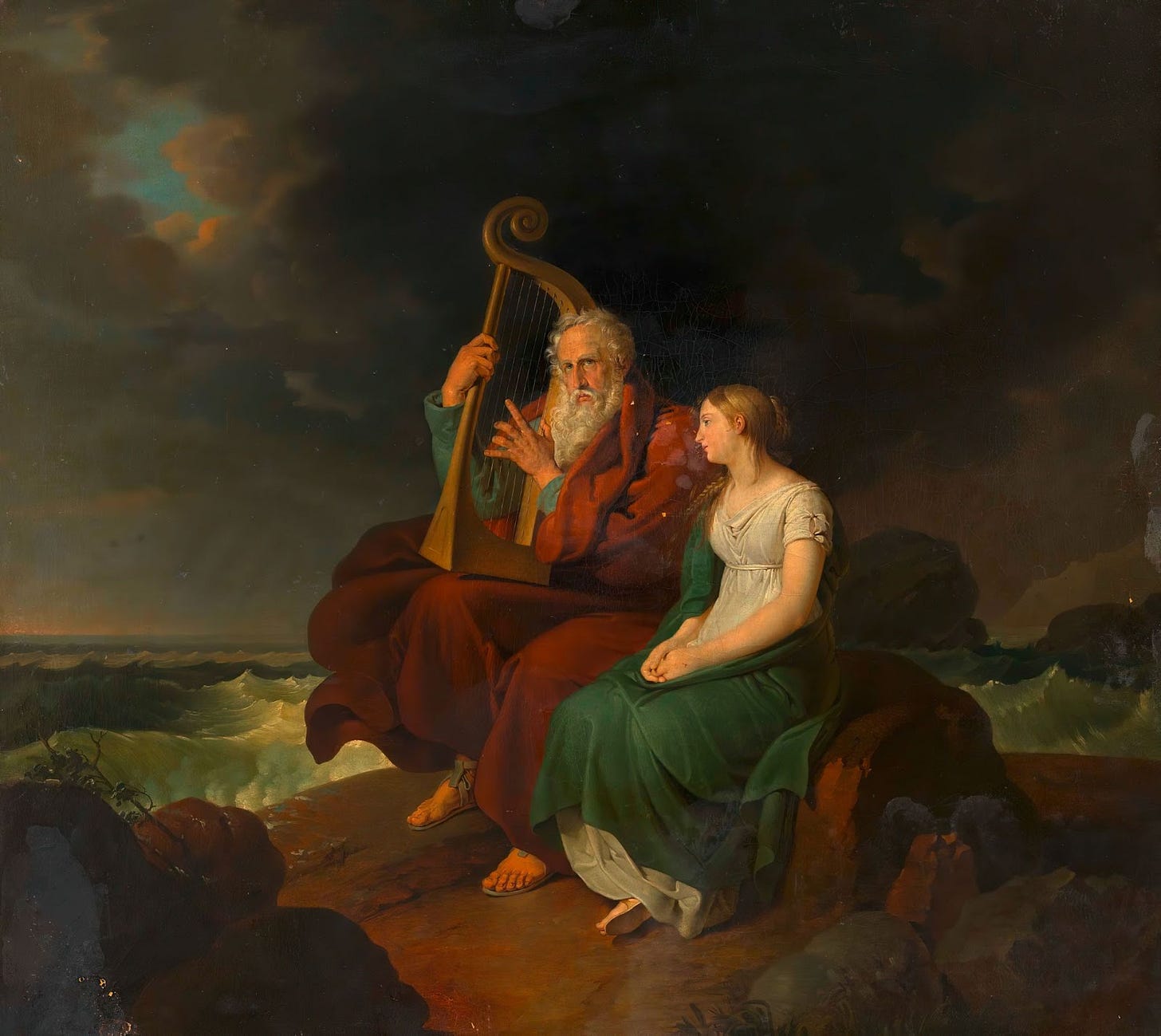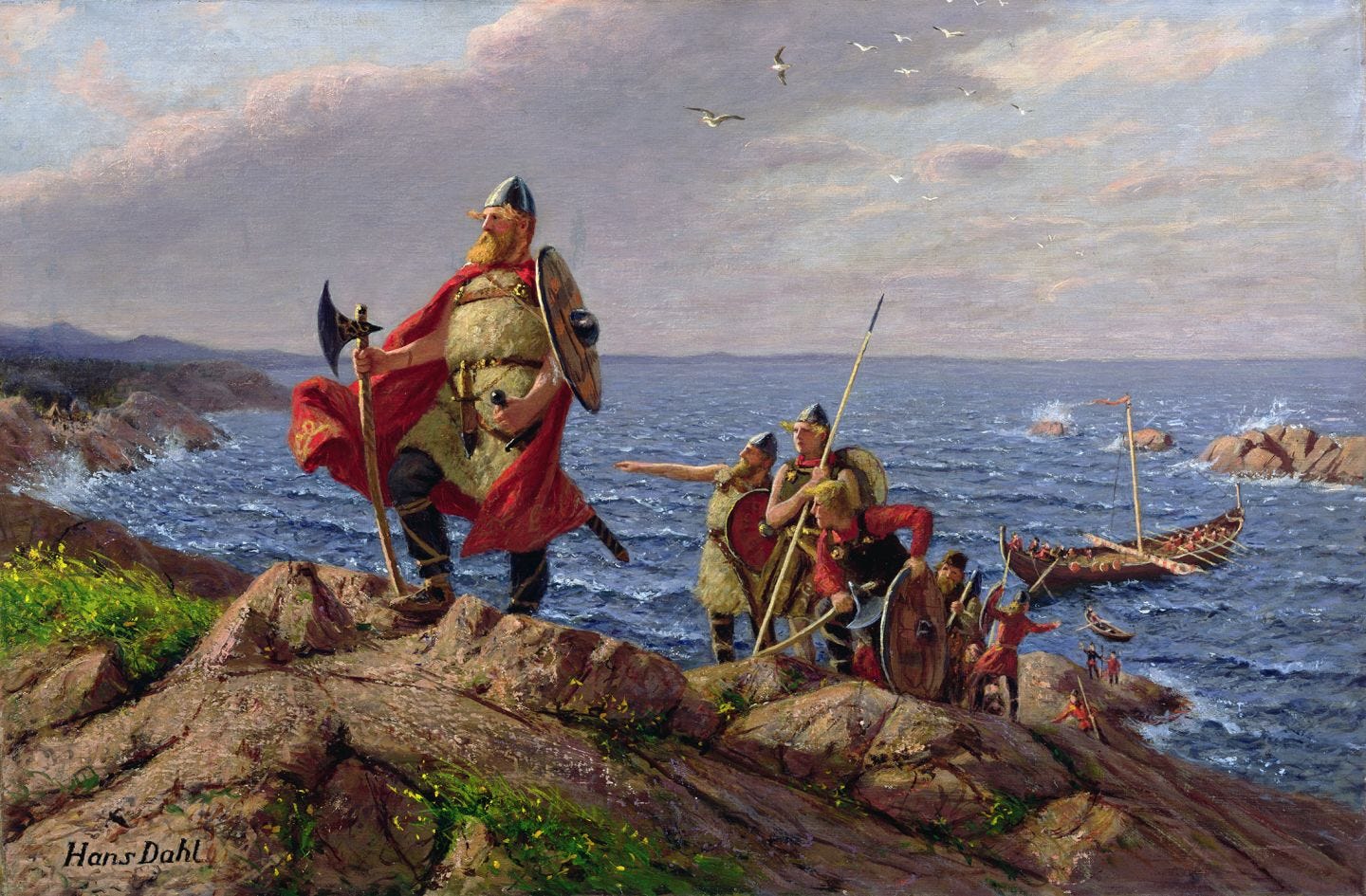The Celtic roots of English
If indeed there are any
English is rather famous for wearing its influences from other languages on its sleeve. It is, after all, pretty hard to write an English sentence without involving a word borrowed from French, not to mention Latin and Old Norse.
But there’s another family of languages which the history of England suggests should have an outsized influence on the English language, and yet… we can’t seem to find any, not unless we look really hard.
I’m referring to the Celtic languages, the family of languages spoken in the British Isles before the arrival of the Germanic-speaking peoples whose languages eventually transformed into English.
These two language families, Celtic and Germanic, have shared1 a chain of islands that, let’s face it, isn’t so very large in the grand scheme of things. So why do we not see more obvious Celtic influence on English?
You're reading The Dead Language Society. I'm Colin Gorrie, linguist, ancient language teacher, and your guide through the history of the English language and its relatives.
Subscribe for a free issue every Wednesday, or upgrade to support my mission of bringing historical linguistics out of the ivory tower and receive two extra Saturday deep-dives per month.
This Saturday, we’ll be playing linguistic detective, exploring the history hidden in English place names. You’ll learn to decode elements like -ham, -ton, and -thorp to reveal the tracks of Normans, Vikings, and Celts across the English landscape.
A lot of this is Julius Caesar’s fault
It’s a story that’s worth starting at the start, with what the Celtic languages are and why they were spoken in Britain at all.
The Celts — I’m using this term as a shorthand for “speakers of Celtic languages” — first appear as Κελτοί Keltoí, written into history by Greek authors in the 6th and 5th centuries BC.
The name, which is of uncertain meaning, referred to a group of peoples of Western Europe, united primarily by the type of language they spoke. Their language (or languages) belonged to a branch of the Indo-European language family which we now call Celtic, after this Greek name.
The Celtic languages seem to have originated as a distinct branch somewhere in Central or Western Europe around 1000 BC. They once extended widely over Europe, arriving in Britain probably around 500 BC, and Celtic-speaking territory extended at its height in the 3rd century BC from Britain and Spain in the west all the way to modern Romania, and even parts of Turkey,2 in the east.
Eventually, however, history took its course, and it was not kind to the Celtic languages. The Iberian Peninsula (modern Spain and Portugal) came slowly under Roman control from 218–19 BC, and, as a result, Celtic died out there by around the 1st century AD.
Later, Julius Caesar brought the Gaulish tribes living in modern-day France under the dominion of Rome in the Gallic Wars of 58–50 BC, which were memorialized in his bestseller De Bello Gallico, much feared by generations of second-year Latin students. Roman rule was later extended to the southern half of Great Britain itself by the emperor Claudius (AD 43).
However, Celtic languages continued to be spoken in these places much longer than in the Iberian Peninsula: Gaulish, the Celtic language of, well, Gaul, survived until the 6th century AD. And Celtic languages are still spoken to this day on the island of Great Britain: Welsh, Cornish, and Scottish Gaelic.
In Britain, the period of Roman rule — which never extended over the entire island of Great Britain — lasted from AD 43–410. During this period, two languages were spoken in what was called the Roman province of Britannia:3 Latin and (Common) Brittonic, the Celtic language that had developed in Great Britain. These languages existed side by side, with Latin being spoken predominantly in the towns and forts, and Brittonic in the countryside.
At the end of the fourth century, however, Roman rule in western Europe was lurching from crisis to crisis. As a result, over the course of a few decades, from AD 383–410, the Roman armies that had been stationed in Britain left, either to defend the core possessions of the empire on the continent, or else to attempt to seize them from a rival Roman ruler.
Either way, this left the Britons, many of whom had become thoroughly Romanized, to the point that they’re referred to as Romano-Britons, to fend for themselves in an increasingly dangerous world.
449 and all that
One of the dangers in this world, from the Romano-British perspective, came from the Germanic peoples of the continent; as Roman power gradually collapsed, Germanic warriors4 — many of whom had served in the Roman army — took advantage of the power vacuum and turned to raiding. In fact, there were probably Germanic speakers on both sides of these raids, since Germanic speakers were present in Roman Britain here and there in Roman garrisons.
Eventually, over the course of the 5th century, raids gave way to settlement. Under some circumstances, Germanic speakers (traditionally identified as the Angles, the Saxons, and the Jutes) migrated to the island of Great Britain, laying the foundation for what would become Anglo-Saxon England. (Poor Jutes, they get left out of the short form.)
But the precise circumstances of this migration are extremely controversial. The traditional interpretation is that it was a large, violent invasion — the adventus Saxonum ‘arrival of the Saxons’ — which resulted in a displacement of the Romano-British to the western fringes of the island, which became modern Wales and Cornwall.
The adventus Saxonum is traditionally dated to the year AD 449. This date comes from Bede, who is one of the main sources for the rest of our story, along with the Anglo-Saxon Chronicle. These sources described this invasion, albeit from a remove of a few (or many) generations. And, like every historical source, they too had their own perspective and narrative agenda.
A revisionist school of thought, which became popular in the late 20th century, held that the migration was small-scale and driven by an élite group who ended up “mingling with” (there’s a good euphemism) the Romano-British, but, due to their élite status, the Germanic newcomers had immense cultural prestige.
The result: the Romano-British locals assimilated in many places into Germanic culture, leading to the gradual development of a kind of English identity, and the use of an (Old) English language, among their descendants.5
Now, with the benefit of ancient DNA studies, a kind of synthesis has arisen: instead of a massive invasion or gradual cultural change, the current consensus is that some sort of large-scale migration did occur, at least in the south and east of England, owing to the existence of widespread continental ancestry in these parts of the country.
But this continental ancestry existed alongside the persistence of local lineages, and the relative proportion of each differed from place to place. In other words, the process wasn’t simply an invasion that displaced the Romano-British; there was probably also an adoption of Germanic language (what would become Old English) and culture by parts of the Romano-British population.
There is one line of evidence I haven’t mentioned so far, however. Any theory of Anglo-Saxon settlement has to take into account one potentially inconvenient fact: Common Britonic, the language of the Romano-British, seems to have had very little influence on Old English, the language that emerged from whatever happened during those mysterious years.6
Note that I said seems. As it turns out, it’s not so simple to figure out just how much Celtic influence there really was on English.
The curious incident
Let’s look first at the traditional point of view, which I’ll summarize like this: When you look at Old English vocabulary, you see almost no words you can trace to the Romano-British.78 There’s some controversy (for a change) about just how many there are. But you can count on one hand the ones that everyone agrees on:9
binn ‘manger’ → Modern English bin
brocc ‘badger’ → Modern English brock
cumb ‘valley’ (but only in place names)
luh ‘sea; pool’
If you’re maximally generous, you can expand that list with some other words, but you’ll still be able to count the total number of Romano-British loanwords into Old English on your hands and feet.
This fact is the least challenging for the theories that propose a wholesale replacement of the Romano-British population. If the speakers of what would become Old English didn’t include many Romano-Britons, we wouldn’t expect to see much influence from their language. On the other hand, if a large majority of Old English speakers descended from Romano-Britons, we would expect to see some influence of their language in Old English.
So, given that one of the major theories of the Anglo-Saxon settlement implies that Romano-Britons and their descendants made up a large proportion of Old English speakers, you can imagine that this result has caused some furrowed brows!
But it has also caused a search for less easily perceptible Romano-British influences on English, those which can’t be seen simply by counting loanwords into Old English. Instead, some scholars have searched for Celtic influence in the grammar of English.10
The most famous piece of evidence used to argue in favour of the existence of Celtic influence on English — the so-called Celtic Hypothesis — is the existence of one of the strangest grammatical phenomena in the English language: something called do-support.
Consider the sentence I am a good person. To negate this sentence, you add not after the verb: I am not a good person. To turn this sentence into a yes-no question, you invert the verb and its subject: Am I a good person? So far, so good. Many European languages function in this way.
But when you try this with almost any other verb in the English language but the verb to be, it sounds strange and archaic to use these strategies: to negate I eat apples., it sounds positively Shakespearean to say I eat not apples.11 Ditto for the question Eat I apples?
Instead, Modern English requires us to add a dummy verb do in these situations. To negate I eat apples, we say I do not eat apples. To question it, we say Do I eat apples? The use of do as a dummy verb here is called do-support.
As it turns out, both Welsh and Cornish (descendants of the Common Brittonic spoken by the Romano-Britons) have similar constructions. Most of the advocates of the Celtic Hypothesis identify Cornish as the most likely source for English do-support for historical and geographical reasons — more on this shortly.
The linguist John McWhorter (who is also on Substack!) wrote a paper in 200912 in which he argued in favour of a Celtic origin of English do-support. He presents data of the following kind from an early form of the Cornish language:
Omma ny wreugh why tryge
here not do you stay
‘You do not stay here.’ (Middle Cornish; McWhorter 2009: 165)
Note the use of wreugh ‘you do’ alongside tryge,13 the main verb carrying the meaning ‘stay,’ in a way that parallels the English You do not stay here.
I won’t go into all of the details of McWhorter’s argument here, but do-support presents a plausible case for Celtic influence on English. The main objection has to do with timing.
Here we return to why Cornish is the most plausible source, rather than Welsh. Do-support first appears in English in southwestern dialects, around where (Middle) Cornish was spoken. But it is first found around AD 1300 (in the middle of the Middle English period). This is 800–900 years after the time when we would have expected the language of the Romano-Britons to have its greatest impact on the English language: that is, sometime in the 5th and 6th centuries.
In other words, if Old English developed out of a Germanic language adopted by a large population of Common Brittonic speakers, it’s natural to expect the effects of Common Brittonic influence to show up not after a delay of almost a millennium, but in the earliest attested forms of English.
Indeed, by the time Old English is written in earnest in the 7th century, it’s already been hundreds of years since the period when Celtic languages would have had their greatest influence. The absence of something like do-support in 700 years of Old and Middle English is therefore a problem for the Celtic Hypothesis to contend with!
Of course, proponents of the Celtic Hypothesis have responses to this objection. I’ll just mention (what is for me) the most convincing one briefly: the kinds of texts written in these early centuries of the English language tended to be formal in nature, and were produced by an educated class. If do-support were around in the early days, and had come from a Celtic source, it may have been looked down upon as “not fit to be written down.”
As you might expect, the debate rages on.
But whatever stance you take on the Celtic Hypothesis, one thing is clear. Given the history of early interactions between the Celtic and Germanic speakers of Britain, the absence of obvious Celtic influences on English is like Sherlock Holmes’ “curious incident of the dog in the night-time.”
If you’re not familiar with that phrase, here’s the source:
Detective: “Is there any point to which you would wish to draw my attention?”
Holmes: “To the curious incident of the dog in the nighttime.”
Detective: “The dog did nothing in the nighttime.”
Holmes: “That was the curious incident.”
The fact that Celtic influence on English, if indeed it exists, is nowhere near as obvious as the influence of French, Norse, and Latin, is our “curious incident.”
It’s a niche academic question in one sense, but if we figure it out, it might help us answer the most controversial questions in the history of England: namely, why there is an England — land of the Angles — at all.
I was going to say “not always amicably,” but languages themselves can’t be friendly or unfriendly to each other. That’s the speakers’ job.
The Celtic region of modern-day Turkey is called Galatia. They’re perhaps most famous today as the recipient of some letters from the Apostle Paul, which made it into the Christian Bible as the Epistle to the Galatians. The name Galatia is related to the Roman name Gallia (English Gaul — hilariously, the names Gaul and Gallia are completely unrelated. A story for another day, I promise.), where some linguistic relatives of the Galatians lived.
Another language, Pictish, was spoken in the northern part of what would become modern Scotland. Pictish was a Celtic language as well, likely a close relative of Common Brittonic.
As with Celt before, I use Germanic here as a shorthand for “speaking a Germanic language.”
You might prefer the term Anglo-Saxon, a later coinage, to distinguish this early notion of Englishness from the later, post-Hundred Years’ War notion of English identity.
Latin, the other language of the Romano-British, did have a big influence on Old English, but under rather different circumstances.
Place names show much more Romano-British influence, especially outside of southeastern England. But that’s another story for another day.
This list is from Coates, Richard (2007). Invisible Britons: The view from linguistics. In Higham (2007). Britons in Anglo-Saxon England.
A great collection of evidence from this search was released in 2009 as Filppula, Markku and Juhani Klemola (2009). Re-evaluating the Celtic Hypothesis. Special Issue English Language and Linguistics 13: Special Issue 2.
Shakespeare himself used both strategies. Beside O where is Romeo, saw you him to day? (Romeo and Juliet 1.1.118), you see things like I did not see you. Welcome, gentle Signior. (Othello 1.3.58)
McWhorter, J. H. (2009). What else happened to English? A brief for the Celtic hypothesis. English Language and Linguistics 13.2: 163–191.
This Middle Cornish word tryge is a form called a verbal noun, corresponding to an English gerund staying or infinitive to stay.






McWhorter, if I recall correctly, also points to the grammatical structure of what we call present progressive verbs as influence from the Celtish languages. E.g., I am reading this book as opposed to I read this book, which McWhorter explains is how other Germanic languages phrase it. (In his book Our Magnificent Bastard Tongue)
Extremely interesting! I call 'do' a proverb by analogy with pronoun. It seems to be disfavored by the grammarrhoids.
Normal English: Do you have a car? No, I don't have a car.
Grammarrhoid: Have you a car? No, I haven't a car.
I wondered how English acquired this unusual feature. Now I know!